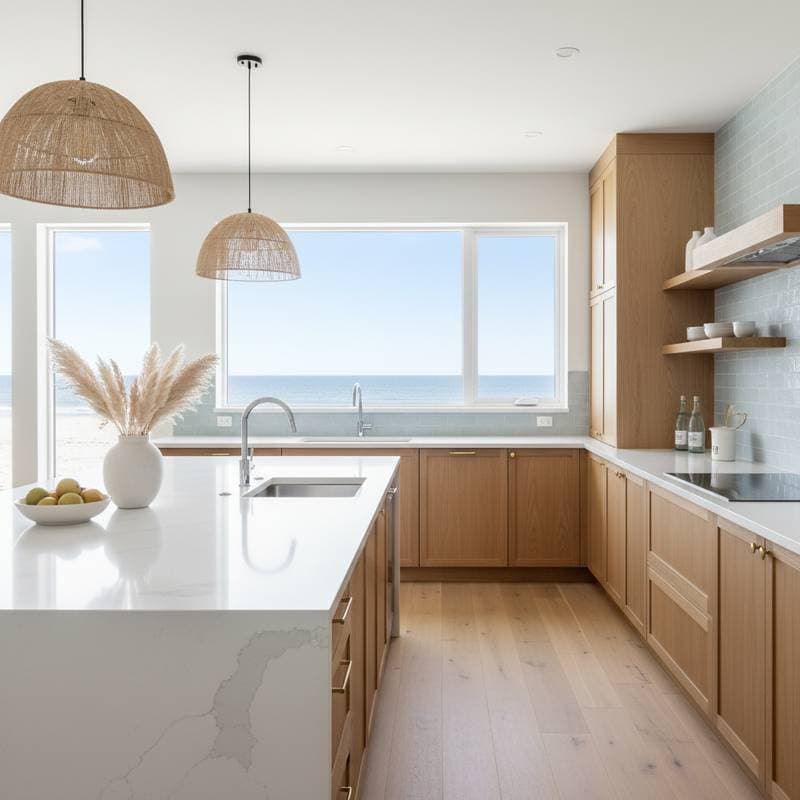Why Coastal Kitchens Are Switching to Quartz
Coastal living brings unique joys, from ocean breezes to stunning views. However, the same environment that enchants homeowners poses challenges for kitchen surfaces. High humidity, salt-laden air, and frequent moisture exposure can degrade traditional materials over time. Quartz countertops emerge as an ideal solution, combining resilience with elegance to withstand these conditions while enhancing the relaxed vibe of seaside homes.
Homeowners in areas like San Diego increasingly favor quartz for its practical benefits. This engineered stone offers a seamless blend of form and function, making it a smart upgrade for any coastal remodel. As more kitchens transition to this material, the reasons become clear: it delivers long-term value without the hassles of upkeep.
Challenges in Coastal Kitchen Design
Seaside locations expose kitchens to relentless environmental pressures. Salt from ocean spray corrodes surfaces, while humidity fosters mold and mildew growth. Traditional stone options often struggle here, developing cracks or stains that demand constant attention.
Sunlight and temperature fluctuations add further strain. Materials that expand or contract unevenly lead to costly repairs. For families who entertain outdoors or cook with fresh seafood, kitchens must endure spills and splashes without losing their appeal.
These factors explain the shift away from porous stones. Homeowners seek alternatives that maintain beauty amid the elements, ensuring their spaces remain inviting year-round.
Key Advantages of Quartz Countertops
Quartz stands out for its engineered composition, typically 90 to 95 percent natural quartz mixed with resins. This creates a non-porous surface that repels water and bacteria, crucial in humid coastal settings.
Superior Durability Against Coastal Elements
Quartz resists the corrosive effects of salt air better than natural stones. Its dense structure prevents penetration by moisture, reducing the risk of warping or discoloration. In tests, quartz surfaces show minimal degradation after years of exposure to simulated seaside conditions.
This material also handles thermal shock well. Hot pots placed directly on quartz cause no damage, unlike some granites that chip under heat. For busy coastal households, this reliability means fewer replacements and more peace of mind.
Effortless Maintenance for Busy Lifestyles
Cleaning quartz requires only soap and water. The non-porous nature eliminates the need for sealants, a regular chore with granite or marble. Stains from wine, coffee, or seafood juices wipe away easily, preserving the pristine look.
In salty environments, quartz avoids the etching that plagues limestone. Homeowners report spending half the time on upkeep compared to other surfaces. This low-maintenance quality frees up weekends for beach outings rather than scrubbing counters.
Aesthetic Versatility for Coastal Styles
Quartz mimics the veining of marble or the speckles of granite, but with uniform patterns. Colors range from soft whites and beiges to subtle grays, complementing airy coastal palettes. Imagine a light quartz slab echoing sea foam against blue cabinetry.
Edges can be customized with eased or bullnose profiles for a softer, beach-inspired feel. Unlike natural stone, quartz ensures consistent slabs, avoiding surprises during installation. This predictability aids designers in creating harmonious, light-filled kitchens.
Eco-Friendly Choice for Sustainable Homes
Many quartz brands use recycled materials, reducing quarry impacts. Production processes consume less energy than mining natural stone, lowering the carbon footprint. Certifications from organizations like the Marble Institute of America verify these sustainable practices.
For environmentally conscious coastal residents, quartz aligns with green building trends. It contributes to healthier indoor air by resisting mold, promoting well-being in moisture-prone areas. Selecting quartz supports both planetary health and home longevity.
How Quartz Compares to Other Countertop Materials
Granite, a popular natural stone, offers beauty but falls short in coastal applications. Its porous surface absorbs humidity and salt, requiring annual sealing to prevent stains. Cracks from thermal changes are common, leading to higher long-term costs.
Marble provides a luxurious look with its soft swirls, yet it etches easily from acidic foods like citrus, prevalent in coastal cuisine. Maintenance intensifies in humid climates, where moisture accelerates wear.
Laminate serves as a budget option but scratches and fades under UV exposure from large coastal windows. Quartz surpasses these with its balance of affordability, durability, and style. Priced midway between laminate and high-end stone, it delivers premium performance without the vulnerabilities.
Choosing and Installing Quartz in Your Coastal Kitchen
Start by assessing your space. Measure counter areas accurately and consider traffic flow. Consult with local fabricators experienced in coastal installations to select slabs that match your vision.
Opt for UV-resistant finishes to combat sun fading. Thicker slabs, around 3 centimeters, provide added strength for island counters used in entertaining. Samples help visualize how quartz integrates with existing fixtures.
Professional installation ensures precise cuts around sinks and appliances. Expect the process to take one to two days, with minimal disruption. Post-installation, avoid harsh chemicals to maintain the warranty, typically 10 to 25 years.
- Evaluate your kitchen's layout and needs.
- Review color and pattern options in natural light.
- Schedule a consultation with certified installers.
- Confirm eco-certifications for sustainable choices.
- Plan for complementary backsplashes to unify the design.
Transform Your Space with Lasting Resilience
Switching to quartz equips coastal kitchens for enduring beauty and functionality. This material not only withstands the seaside rigors but elevates daily living with its practical elegance. Homeowners who make the change enjoy spaces that reflect the effortless grace of coastal life.
Consider the investment in terms of joy and savings. Quartz countertops promise years of reliable service, allowing focus on what matters: creating memories by the sea. Your kitchen becomes a resilient hub, ready for every tide and season.

